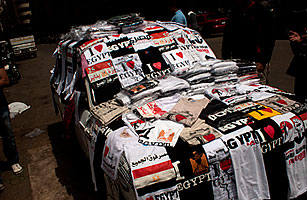
On April 1, the people returned to Tahrir Square by the thousands
— to remind the military government that they were still there and
hoping for a clearer path to democracy, and because it was fun. The
square was tricked out like a music festival, with competing stages:
dozens of impromptu platforms for the Socialists, the Socialist Workers,
the Egyptian Youth Union and various other secular subdivisions. There
were trinket and food sellers moving through the crowd and young people
with huge plastic bags picking up the litter. There were no police; I
saw four young men break up and then calmly mediate a fistfight between
two older men. But there was something missing in the festival of
democracy: “The Muslim Brotherhood aren’t here today,” said my guide,
Elijah Zarwan of the International Crisis Group. “They don’t need to
protest anymore. They’re back in the neighborhoods, organizing.”
“We need to organize,” Mahmoud Salem, a popular blogger better known as
Sandmonkey, tells me the next day as we sit at an outdoor caf.
“The largest youth party now is the Couch Party.” Actually, there is
organizing aplenty going on in Egypt — but mostly from the top down,
youth coalitions forming and splintering, business leaders and members
of parliament announcing new parties almost every day. Not even the
Muslim Brotherhood is immune: there was a split between the youth, who
insisted on joining the Tahrir Square revolutionaries, and the elders
— and now there’s another potential split between moderates and the
extremists. “We don’t know what impact freedom will have on the Muslim
Brotherhood,” a well-known student leader told me. “And I don’t care. If
they’re for freedom, I’m for them.” Indeed, the overwhelming sense that you get from the chattering
classes in Egypt, two months after the overthrow of Hosni Mubarak, is a
kind of joyous confusion. Languorous debates take place over arcane
constitutional codicils that no one knew existed before, or about
whether Egypt should remain a presidential system or become a
parliamentary democracy, or whether the parliamentary elections
scheduled for September should come after the presidential elections
scheduled for November. Some of the young people are suspicious of the
military council running the country; others, like Abdallah Helmy of the
Revolution Youth Union, have been meeting with the military and are
convinced of its benign intent. “I feel as if my head is exploding,”
says Sarrah Abdelrahman, of the eponymous Sarrahsworld video blog, who
is sitting with me and Sandmonkey — a true motormouth — at the
caf. “I feel bombarded with talk, talk, talk, but I am so happy
too. I feel as if I have so much energy since the revolution.”